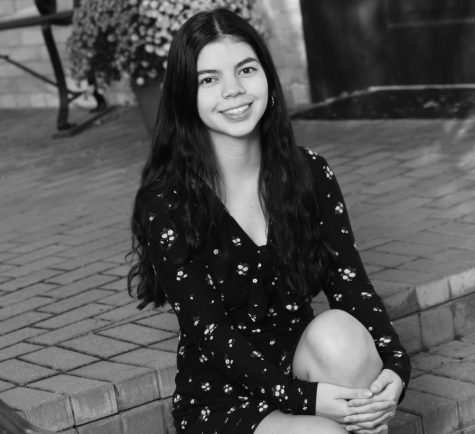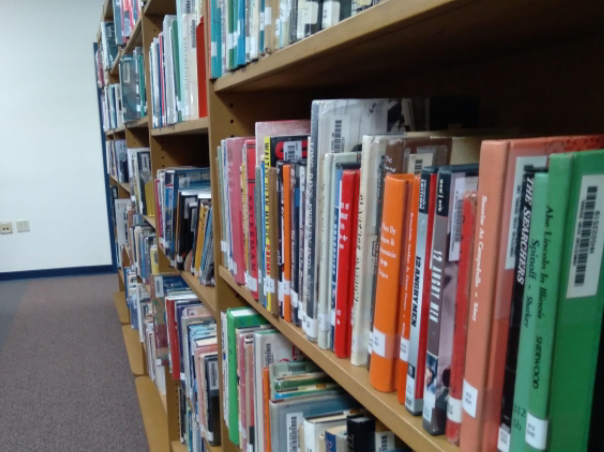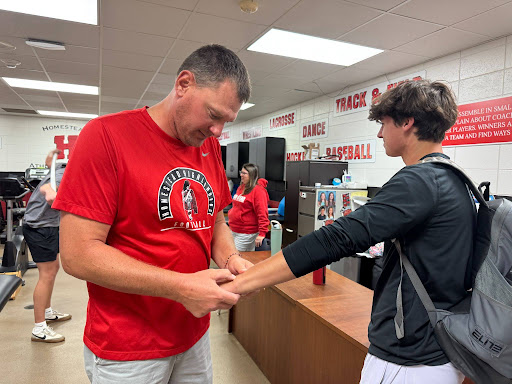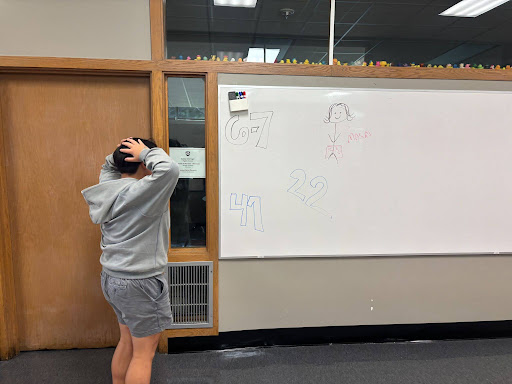Book bans rise in recent months
Stories sit on display shelves inside of Homestead’s Inquiry Wing.
Whether it be students cramped inside of a dimly lit classroom, friends hushed around a library table or relatives amused on an aging family sofa—the content found inside of books has an uncanny way of drawing people together. Books hold the power to educate and inform, as well as evoke emotion and touch readers with relatable experiences that permeate the lives of all.
It is not uncommon for books to spark conversation on thought provoking topics. However, sometimes the subject matter being presented to young people in schools is called into question.Book bans are the result of concerns being raised over a story’s subject matter and often occur when people are uncomfortable with its messaging or feel that it is inappropriate for the intended audience.
According to the American Library Association (ALA), the most common reasons for books to be challenged are sexually explicit content, offensive language and material that is not suitable for an age group.
Many view book censorship as an issue of parental choice. They believe that parents should have some level of input and control over the material that is being taught to their kids.
Tiffany Justice, founder of Moms for Liberty, told the New York Times, “Parents should not be vilified for asking if a book is appropriate. Some of the books being challenged involve sexual activity…and children are not ready for that kind of material.”
Others say that censoring certain stories for some kids, affects the opportunities and education of those who share a different point of view. The New York Times said, “…prohibiting these titles altogether violates the rights of other parents and the rights of children who believe access to these books is important.”
With restrictive policies arising in Oklahoma high schools and bans taking over Tennessee libraries, attempts to censor books have recently spiked in startling numbers across the country.
A report done by the ALA recorded 330 book challenges in the fall of 2021. Vox described it as “an uptick from the same periods in recent years.”
Though the numbers may fluctuate over time, the books being challenged are often the same ones in different facilities. The ALA reviewed the censorship reports it received over the past 10 years and found that The Absolutely True Diary of a Part Time Indian by Sherman Alexie, a book that was formally challenged at Homestead in the fall of 2021, topped the list.
The process that takes place when a book is challenged is often tedious and lengthy, as is the procedure for integrating new stories into a school system.
When books are purchased for Homestead students, much thought and consideration is put into the pieces before they make their way into the school.
Suzanne Zellmann, research and digital learning specialist, said, “For the library, we have a set of guidelines that support school board policy. When we select a title for the collection, we are looking at many areas. First and foremost, we look at curriculum and our educational goals. We look at individual student needs and interests, diversity of topics, and accessibility of reading levels.”
If the book meets these requirements, professional review sources are analyzed and read by an appointed committee of literacy specialists, faculty and students before the final purchase is made.
The multifaceted nature of the process is amplified by the array of maturity levels students possess in a high school.
“[When deciding what to purchase] It’s grades 9-12. So it’s trying to meet the needs of students in that whole range, some who are about to leave for college and some who have just exited middle school and are coming to us,” Zellmann said.
Historically, when complaints arise with books available to students at Homestead, conversations among parents and authority figures at the school will take place.
Zellmann said, “If I receive a concern about a book, I begin by listening to the issues. I will revisit the professional reviews and read the book if I haven’t. We will have a conversation about the purpose of the title and how closely it fits our collection goals in support of the needs and interests of all students.”
While students rarely instigate book challenges, their learning experiences are heavily impacted by the outcomes.
Olivia Cagle, senior, said, “…If an adult cannot look past certain elements of a book despite the life-changing message it could provide to a student, this harms not only students but everyone. If one book gets banned, people just start looking for the next one and so on, but when would it stop? What book is left to read? In my opinion, a book being banned marks it with controversy- all the more reason to read it, gain your own perspective on the piece, and contribute to scholarly discourse, within reason of course.”
Nick Hemr, senior, argues that books have a transformative aspect that should also be considered.
“Books being censored is not a waste of time but a little foolish,” he said. “The way we learn and experience good and bad is through books, whether it be Of Mice and Men or any other books, they’re little life experiences. It puts you in the moment and it’s very powerful that way.”
With all perspectives in mind, educators at the school continuously strive to provide students with material that caters to the needs of all.
“I believe it is important for students and their families to have reading options that offer a variety of formats, topics and viewpoints,” Zellmann said. “We collect materials that enrich and support the curriculum and offer a wide range of topics allowing for the presentation of different points of view. In our district, we are fortunate to have experienced specialists in each building who work with students, parents, and faculty in matching individuals with reading materials that fit their personal interests and academic goals.”

Abigail has been in publications for two years and is currently a senior. In her free time, she enjoys creative writing, playing guitar, and spending time...






